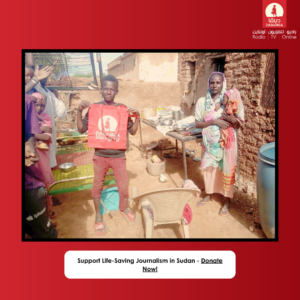Internews: Most fake COVID-19 rumours in Sudan concerned with possible treatments or cures
USA-based NGO Internews published a community feedback report on COVID-19 information and rumours in Sudan. Last week, Sovereignty Council member and alternate Chair of the Supreme Committee for Health Emergencies, Prof Siddig Tawir, warned against “deliberate misinformation spread by some circles” on the COVID-19 pandemic.
 Vaccines and the world's battle against the coronavirus - Cartoon by Omar Dafallah (RD)
Vaccines and the world's battle against the coronavirus - Cartoon by Omar Dafallah (RD)
USA-based NGO Internews published a community feedback report on COVID-19 information and rumours in Sudan. Last week, Sovereignty Council member and alternate Chair of the Supreme Committee for Health Emergencies, Prof Siddig Tawir, warned against “deliberate misinformation spread by some circles” on the COVID-19 pandemic.
The Rooted In Trust (RiT) Project by Internews tracks COVID-19-related rumours circulating among social media users and vulnerable communities in Sudan, as well as other countries around the globe.
This information on the spread of rumours is used to inform risk communication efforts by humanitarian organisations and public health actors. It also serves to “support local media in disseminating more accurate and actionable information that responds to community questions and concerns”.
Internews has published its result in the Sudan COVID-19 Community Feedback Booklet, which contains a ‘snapshot of community feedback’ highlighting a variety of COVID-19 rumours and shared perceptions across six states.
Between 24 January and 18 February 2021, the organisation collected and analysed 1,350 rumours and perceptions from six states: Khartoum, Kassala, South Kordofan, Blue Nile state, West Darfur, and South Darfur.
Volunteers conducted another 160 focus groups to better under information gaps and misconceptions about COVID-19. 1,844 men, women, children, youth, older people, and people with disabilities, including refugees and internally displaced people, participated in these interactive face-to-face discussions.
The researchers found, among other things, that there were more high-risk rumours (rumours that are very likely to be believed among the larger community with potentially severe impacts resulting in serious harm) in Khartoum than in other states.
'As there is no cure for COVID-19, people are relying on a variety of herbal remedies and readily available home remedies'
Most rumours (52%) were related to possible treatments or cures for COVID-19 infections and Internews explained: “as there is no cure for COVID-19, people are relying on a variety of herbal remedies and readily available home remedies to treat a COVID-19 infection, along with a few medical drugs”.
“People have relied on their environment, agricultural produce, and livestock in an attempt to treat a COVID-19 infection.” The organisation further explained: “Herbal remedies and other readily available treatments in the six states are considered the best alternatives for treating COVID-19 or other medical conditions, since […] healthcare facilities are limited or unavailable in conflict-affected and rural areas”.
“Community feedback has also revealed that even when access to healthcare is not a challenge, some communities continue to rely on treating the virus and other diseases at home and seeking medical care only when their loved one’s health condition becomes critical.”
Only 1% of rumours was concerned with vaccines. More rumours were concerned with the government, COVID-19 as a hoax, religion, immunity, and other things.
Internews hopes that the insights published in the report will help humanitarian organisations and public health responders in Sudan address communities’ humanitarian and health information needs.
Misinformation in Sudan
Just last week, Siddig Tawir warned that there has been “deliberate misinformation spread by some circles” from the beginning of the COVID-19 pandemic. He urged the media and reporters to continue the struggle against misleading rumours about COVID vaccines.
'The culture of Sudanese communities often contradicts the state’s efforts to curb the spread of the virus'
Tawir pointed out that “the culture of Sudanese communities often contradicts the state’s efforts to curb the spread of the virus”. He called for more research in anticipation of the continuation of the pandemic and the emergence of new variants.











 and then
and then